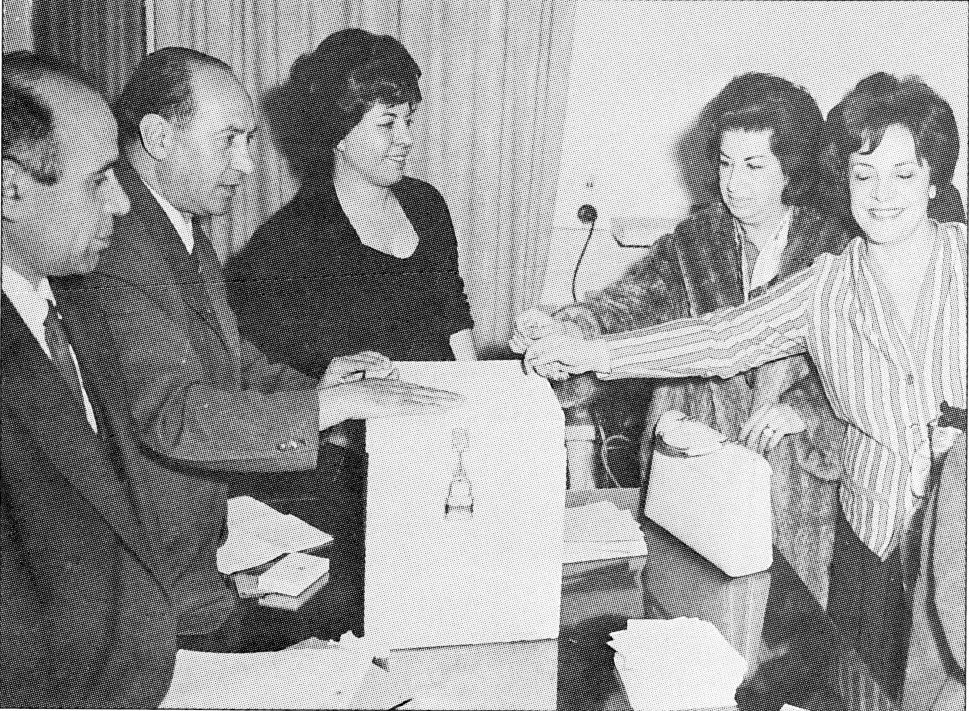1963 Iranian referendum on:
[Wikipedia]
[Google]
[Amazon]
 A referendum was held in
A referendum was held in
 A referendum was held in
A referendum was held in Iran
Iran, officially the Islamic Republic of Iran, and also called Persia, is a country located in Western Asia. It is bordered by Iraq and Turkey to the west, by Azerbaijan and Armenia to the northwest, by the Caspian Sea and Turkmeni ...
on 26 January 1963 by the decree of Mohammad Reza Shah
, title = Shahanshah Aryamehr Bozorg Arteshtaran
, image = File:Shah_fullsize.jpg
, caption = Shah in 1973
, succession = Shah of Iran
, reign = 16 September 1941 – 11 February 1979
, coronation = 26 October ...
, with an aim to show popular support for him, asking voters to approve or veto the reforms of the White Revolution.
Women were not officially allowed to vote, but were set up to vote at their own balloting counters and dedicated boxes, at the suggestion of Ministry of Agriculture Hasan Arsanjani. The results gave Iranian women the right to vote
Suffrage, political franchise, or simply franchise, is the right to vote in public, political elections and referendums (although the term is sometimes used for any right to vote). In some languages, and occasionally in English, the right to v ...
.
Criticism
Despite the apparent benign nature of the proposals in the referendum, there was significant opposition. Opponents included major landowners,ulema
In Islam, the ''ulama'' (; ar, علماء ', singular ', "scholar", literally "the learned ones", also spelled ''ulema''; feminine: ''alimah'' ingularand ''aalimath'' lural are the guardians, transmitters, and interpreters of religious ...
and communists.
Ayatollah Ruhollah Khomeini
Ruhollah Khomeini, Ayatollah Khomeini, Imam Khomeini ( , ; ; 17 May 1900 – 3 June 1989) was an Iranian political and religious leader who served as the first supreme leader of Iran from 1979 until his death in 1989. He was the founder of ...
called for boycotting the referendum as "un-Islamic".
National Front boycotted the referendum, criticizing that the measures did not come from the parliament
In modern politics, and history, a parliament is a legislative body of government. Generally, a modern parliament has three functions: representing the electorate, making laws, and overseeing the government via hearings and inquiries. Th ...
.
Voters were asked six questions, but had only the option to vote yes or no to the total package.
The ballots for 'Yes' were white, while the negative ones were green.
Similar to the previous referendum, polling places lacked secrecy
Secrecy is the practice of hiding information from certain individuals or groups who do not have the "need to know", perhaps while sharing it with other individuals. That which is kept hidden is known as the secret.
Secrecy is often controvers ...
and there were two separate voting booths: one for the supporters and one for the opponents. "No sane man would enter the opposition booth", according to Mohammad Gholi Majd
Mohammad Gholi Majd ( fa, محمدقلی مجد), also known as M.G. Madjd, is an author whose primary field of work is modern history of Iran.
Majd obtained a PhD in agricultural economics from Cornell University in 1978, and was a visiting lectu ...
.
Party policies
Results
Aftermath
Following the referendum dissension and riots outbroke in almost all major urban areas, most significantly inTehran
Tehran (; fa, تهران ) is the largest city in Tehran Province and the capital of Iran. With a population of around 9 million in the city and around 16 million in the larger metropolitan area of Greater Tehran, Tehran is the most popul ...
and the city of Qom
Qom (also spelled as "Ghom", "Ghum", or "Qum") ( fa, قم ) is the seventh largest metropolis and also the seventh largest city in Iran. Qom is the capital of Qom Province. It is located to the south of Tehran. At the 2016 census, its pop ...
. The Shah gave orders to immediate suppression of the opposition and National Front, Freedom Movement, Tudeh Party and religious activists were imprisoned. The unrest made Ayatollah Ruhollah Khomeini
Ruhollah Khomeini, Ayatollah Khomeini, Imam Khomeini ( , ; ; 17 May 1900 – 3 June 1989) was an Iranian political and religious leader who served as the first supreme leader of Iran from 1979 until his death in 1989. He was the founder of ...
the regime's principal opponent in the minds of most Iranians.
References
{{Iranian elections Referendums in IranIran
Iran, officially the Islamic Republic of Iran, and also called Persia, is a country located in Western Asia. It is bordered by Iraq and Turkey to the west, by Azerbaijan and Armenia to the northwest, by the Caspian Sea and Turkmeni ...
Constitutional referendum
A referendum (plural: referendums or less commonly referenda) is a direct vote by the electorate on a proposal, law, or political issue. This is in contrast to an issue being voted on by a representative. This may result in the adoption of a ...
Suffrage referendums
Electoral reform referendums
Privatisation referendums
Women's rights in Iran